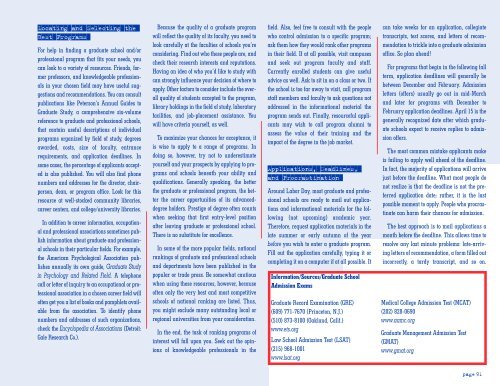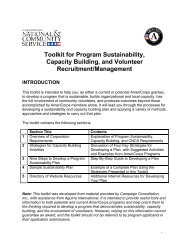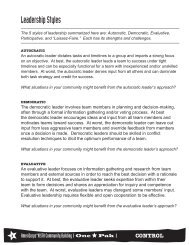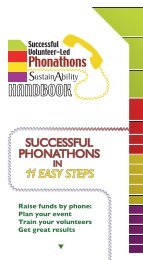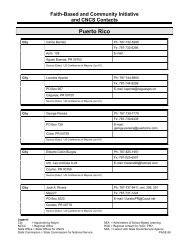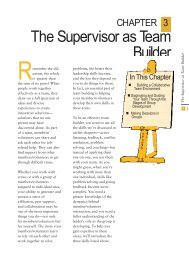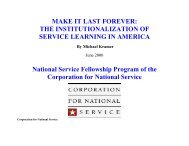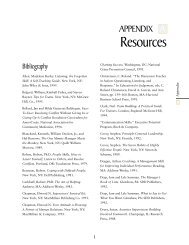Next Steps: Life After Americorps - National Service Knowledge ...
Next Steps: Life After Americorps - National Service Knowledge ...
Next Steps: Life After Americorps - National Service Knowledge ...
You also want an ePaper? Increase the reach of your titles
YUMPU automatically turns print PDFs into web optimized ePapers that Google loves.
Locating and Selecting the<br />
Best Programs<br />
For help in finding a graduate school and/or<br />
professional program that fits your needs, you<br />
can look to a variety of resources. Friends, former<br />
professors, and knowledgeable professionals<br />
in your chosen field may have useful suggestions<br />
and recommendations. You can consult<br />
publications like Peterson’s Annual Guides to<br />
Graduate Study, a comprehensive six-volume<br />
reference to graduate and professional schools,<br />
that contain useful descriptions of individual<br />
programs organized by field of study, degrees<br />
awarded, costs, size of faculty, entrance<br />
requirements, and application deadlines. In<br />
some cases, the percentage of applicants accepted<br />
is also published. You will also find phone<br />
numbers and addresses for the director, chairperson,<br />
dean, or program office. Look for this<br />
resource at well-stocked community libraries,<br />
career centers, and college/university libraries.<br />
In addition to career information, occupational<br />
and professional associations sometimes publish<br />
information about graduate and professional<br />
schools in their particular fields. For example,<br />
the American Psychological Association publishes<br />
annually its own guide, Graduate Study<br />
in Psychology and Related Field. A telephone<br />
call or letter of inquiry to an occupational or professional<br />
association in a chosen career field will<br />
often get you a list of books and pamphlets available<br />
from the association. To identify phone<br />
numbers and addresses of such organizations,<br />
check the Encyclopedia of Associations (Detroit:<br />
Gale Research Co.).<br />
Because the quality of a graduate program<br />
will reflect the quality of its faculty, you need to<br />
look carefully at the faculties of schools you’re<br />
considering. Find out who these people are, and<br />
check their research interests and reputations.<br />
Having an idea of who you’d like to study with<br />
can strongly influence your decision of where to<br />
apply. Other factors to consider include the overall<br />
quality of students accepted to the program,<br />
library holdings in the field of study, laboratory<br />
facilities, and job-placement assistance. You<br />
will have criteria yourself, as well.<br />
To maximize your chances for acceptance, it<br />
is wise to apply to a range of programs. In<br />
doing so, however, try not to underestimate<br />
yourself and your prospects by applying to programs<br />
and schools beneath your ability and<br />
qualifications. Generally speaking, the better<br />
the graduate or professional program, the better<br />
the career opportunities of its advanceddegree<br />
holders. Prestige of degree often counts<br />
when seeking that first entry-level position<br />
after leaving graduate or professional school.<br />
There is no substitute for excellence.<br />
In some of the more popular fields, national<br />
rankings of graduate and professional schools<br />
and departments have been published in the<br />
popular or trade press. Be somewhat cautious<br />
when using these resources, however, because<br />
often only the very best and most competitive<br />
schools of national ranking are listed. Thus,<br />
you might exclude many outstanding local or<br />
regional universities from your consideration.<br />
In the end, the task of ranking programs of<br />
interest will fall upon you. Seek out the opinions<br />
of knowledgeable professionals in the<br />
field. Also, feel free to consult with the people<br />
who control admission to a specific program;<br />
ask them how they would rank other programs<br />
in their field. If at all possible, visit campuses<br />
and seek out program faculty and staff.<br />
Currently enrolled students can give useful<br />
advice as well. Ask to sit in on a class or two. If<br />
the school is too far away to visit, call program<br />
staff members and faculty to ask questions not<br />
addressed in the informational material the<br />
program sends out. Finally, resourceful applicants<br />
may wish to call program alumni to<br />
assess the value of their training and the<br />
impact of the degree in the job market.<br />
Applications, Deadlines,<br />
and Procrastination<br />
Around Labor Day, most graduate and professional<br />
schools are ready to mail out applications<br />
and informational materials for the following<br />
(not upcoming) academic year.<br />
Therefore, request application materials in the<br />
late summer or early autumn of the year<br />
before you wish to enter a graduate program.<br />
Fill out the application carefully, typing it or<br />
completing it on a computer if at all possible. It<br />
Information/Sources/Graduate School<br />
Admission Exams<br />
Graduate Record Examination (GRE)<br />
(609) 771-7670 (Princeton, N.J.)<br />
(510) 873-8100 (Oakland, Calif.)<br />
www.ets.org<br />
Law School Admission Test (LSAT)<br />
(215) 968-1001<br />
www.lsat.org<br />
can take weeks for an application, collegiate<br />
transcripts, test scores, and letters of recommendation<br />
to trickle into a graduate admission<br />
office. So plan ahead!<br />
For programs that begin in the following fall<br />
term, application deadlines will generally be<br />
between December and February. Admission<br />
letters (offers) usually go out in mid-March<br />
and later for programs with December to<br />
February application deadlines. April 15 is the<br />
generally recognized date after which graduate<br />
schools expect to receive replies to admission<br />
offers.<br />
The most common mistake applicants make<br />
is failing to apply well ahead of the deadline.<br />
In fact, the majority of applications will arrive<br />
just before the deadline. What most people do<br />
not realize is that the deadline is not the preferred<br />
application date; rather, it is the last<br />
possible moment to apply. People who procrastinate<br />
can harm their chances for admission.<br />
The best approach is to mail applications a<br />
month before the deadline. This allows time to<br />
resolve any last minute problems: late-arriving<br />
letters of recommendation, a form filled out<br />
incorrectly, a tardy transcript, and so on.<br />
Medical College Admission Test (MCAT)<br />
(202) 828-0690<br />
www.aamc.org<br />
Graduate Management Admission Test<br />
(GMAT)<br />
www.gmat.org<br />
page 91


